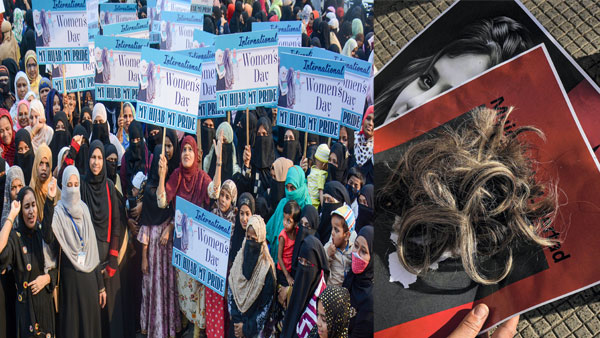
To wear or not to wear hijab is the dilemma confronting Muslim women the world over
Paradoxically, Muslim women in Karnataka are fighting to wear hijab, while Muslim women in Iran are laying their life for not wearing them.
The refusal by six girls of a junior government college in Kundapura in Udupi district of Karnataka to attend classes without Hijab had kicked off a major communal storm in February this year.
All that college management wanted was to enforce uniformity in students' dress to foster a sense of discipline and secular temperament. But radical Islamic groups and Imams called it an invasion of their girls' religious identity.

Consequently, violent mobs clashed with police in different parts of the state and hijab marches were taken out in Punjab, Rajasthan, Tamil Nadu, Andhra Pradesh, Telangana and Maharashtra. It was one more attempt by them to pursue exclusionist agenda like holidays on Friday in educational institutions, separate prayer rooms in commercial and official establishments, right to pray on government land and exemption from body search at airports, electoral booths and sensitive public places.
Muslim hotheads and preachers were not alone in protesting. Non-BJP political parties, with an eye on Muslim votes, quickly came forward in their support. Liberals were not far behind in terming hijab ban as a non-secular, draconian measure. Lo and behold, it also found a traction in the supreme court.

In a split verdict, justice Dhulia ruled that wearing hijab was a matter of choice and asking Muslim girls to take them off, was an invasion of their privacy and dignity, guaranteed by the constitution. He added that right to education was girls' fundamental right which could not be denied because they did not wear hijab. One hopes the mavericks will not take justice Dhulia's words literally and start attending classes, courts and security institutions in fancy dresses, turning them into carnivals.
The supreme court's final ruling on this subject will settle for generations how much we are willing to surrender progressive ideas to accommodate religious obscurantism in a democracy.
Contrast Muslim reaction in India with what is happening in Iran, a highly conservative Islamic nation for past five weeks. Paradoxically, Muslim women in Karnataka are fighting to wear hijab, while Muslim women in Iran are laying their life for not wearing them. On September13, Mahsa Amin, a 22-year-old Kurdish woman of Saqqez was arrested by the Morality police (known as 'Guidance Patrol') and detained in a re-education centre for violating country's compulsory veiling laws. After three days of torture and a fatal blow to her head, Mahsa went into coma and died.
The incident triggered massive protests in 156 cities and universities in 31 provinces. Hundreds of women cut or shaved their hair in public and burnt hijab, shouting 'no to headscarf, yes to life, freedom and equality'. Scores of schoolgirls blocked traffic in Shiraz, Karaj, Tehran, Saqeez, Sanandaj and nine other cities, waving and throwing their headscarf in air, chanting slogans against clerical authorities and asking others to unite lest they are killed one by one.
President Raisi, a hardliner, called the protesters hooligans and Ayatollah Khamenei accused the US and Israel of orchestrating riots. The Iranian security forces have since killed 224 activists including 34 children and detained over 12500.

The Kundapura college management has received more scorn than appreciation. Iranian girls, on the other hand, have evoked massive support from more than 63 countries and international community. The United Nations, the EU, the US, the UK and Canada have adopted resolutions condemning violence against Iranian women and imposed sanctions against the morality police, banned visas and ordered seizure of their property and assets.
Abir Al-Shablani, a Swedish MEP cut off her hair while speaking in European Parliament. Similarly, 50 French women including artists and singers cut off their hair in Paris. In Italy, visitors to National Centre for contemporary Art and Architecture in Rome left their hair in a transparent box at the entrance to be delivered to the Iranian Embassy.
Significantly, most Muslim nations preferred not to take sides, caught between increasing demands for freedom of choice and religious practices. These are food for thought for both reformers and deaf and dumb.
(Amar Bhushan worked with the Research and Analysis Wing for 24 years after briefly serving in the BSF intelligence, State Special Branch and Intelligence Bureau. He served as the Special Secretary in the Cabinet Secretariat before he retired in 2005.)
Disclaimer: The opinions expressed in this article are the personal opinions of the author. The facts and opinions appearing in the article do not reflect the views of OneIndia and OneIndia does not assume any responsibility or liability for the same.


 Click it and Unblock the Notifications
Click it and Unblock the Notifications
































